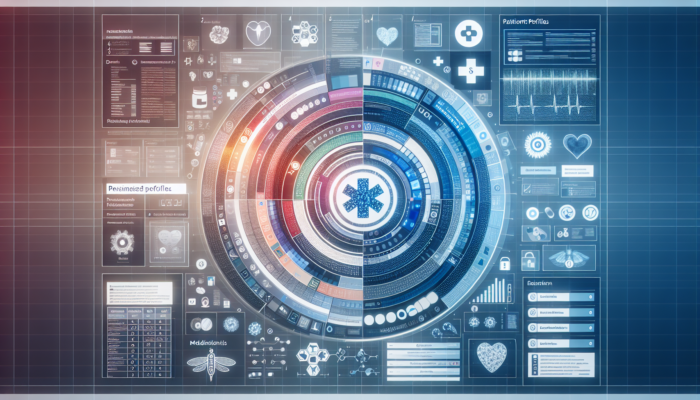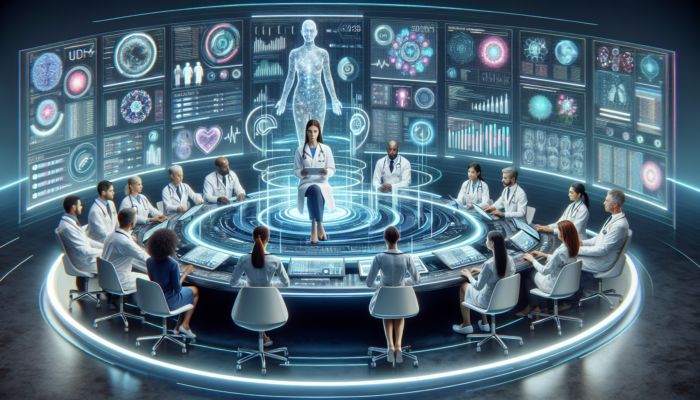Healthcare CRM Solutions: Your Guide to Effective Implementation
In the dynamically changing landscape of the healthcare industry, effectively managing customer relationships has emerged as a critical priority for healthcare organizations. By leveraging advanced Customer Relationship Management (CRM) solutions, healthcare providers can enhance operational workflows, boost patient satisfaction, and elevate overall efficiency. This detailed guide aims to delve into the multifaceted world of healthcare CRM solutions, offering invaluable insights for technology professionals seeking to optimize their practices.
Exploring the Importance of Healthcare CRM Solutions
Defining Healthcare CRM: A Comprehensive Overview

Healthcare CRM represents a targeted software system crafted to enhance and manage the interactions between healthcare providers and their patients effectively. This innovative platform serves as a centralized hub that amalgamates patient data, facilitates communication, and automates numerous processes to enhance the quality of healthcare delivery. By employing such systems, healthcare organizations can ensure consistent and personalized patient interactions.
These specialized healthcare CRM solutions are instrumental in elevating the quality of patient care by furnishing healthcare professionals with an all-encompassing view of patient information. This comprehensive view encompasses vital aspects such as medical history, treatment protocols, test outcomes, appointment schedules, and more. By consolidating this data in a single, easily accessible location, healthcare providers can make more informed clinical decisions, deliver tailored care, and ultimately enhance patient outcomes and satisfaction.
The Critical Significance of Healthcare CRM in Modern Healthcare
The adoption of a robust healthcare CRM solution comes with a multitude of advantages. Here are several compelling reasons why healthcare organizations ought to prioritize the implementation of CRM systems:
- Personalized Patient Experience Enhancement: CRM solutions empower healthcare providers to customize patient interactions, resulting in heightened patient satisfaction and loyalty.
In the realm of healthcare, delivering personalized care is paramount for cultivating robust patient relationships. A sophisticated healthcare CRM solution enables providers to customize their services according to individual patient preferences, medical histories, and specific requirements. This level of tailored interaction significantly enriches the patient experience, fostering greater satisfaction and loyalty among patients who feel truly valued in their healthcare journey.
- Streamlined Workflow Management: Implementing a comprehensive CRM system allows healthcare professionals to optimize administrative tasks, automate appointment scheduling, and manage patient data efficiently.
Handling administrative responsibilities can often be laborious and fraught with potential errors. A healthcare CRM solution automates a range of administrative functions, such as appointment scheduling, billing, and document management, thereby alleviating the burden on healthcare staff. By minimizing manual interventions and streamlining workflows, healthcare providers can reclaim valuable time, enhance operational efficiency, and devote more energy to delivering exceptional care to their patients.
- Targeted Marketing and Effective Communication: CRM technology enables healthcare organizations to segment their patient populations, facilitating targeted marketing campaigns and personalized communications based on specific demographic or health-related criteria.
Effective communication is vital for engaging patients and nurturing strong relationships. Healthcare CRM solutions allow organizations to categorize their patient populations according to demographics, medical conditions, or other pertinent criteria. This segmentation enables the execution of targeted marketing initiatives and personalized messaging, ensuring patients receive relevant information tailored to their unique needs. Such targeted strategies can significantly enhance patient engagement, improve appointment adherence, and promote proactive health management within the patient community.
- Boosting Patient Engagement: By utilizing CRM solutions, healthcare providers can enhance patient engagement through various channels, including portal messaging, automated reminders, and personalized health education content.
Engaging patients is essential for encouraging proactive health management and ensuring adherence to treatment plans. A healthcare CRM solution provides a means for healthcare providers to connect with patients through multiple channels, such as patient portals, SMS, email, or mobile applications. These communication methods can facilitate automated appointment reminders, deliver educational content, gather feedback, and address patient inquiries. By fostering continuous engagement and keeping patients informed, healthcare providers empower individuals to take an active role in their healthcare journeys, ultimately improving health outcomes.
- Data-Driven Analytical Decision Making: CRM systems offer valuable insights into patient demographics, preferences, and behaviors, empowering healthcare organizations to make informed, data-driven decisions and implement effective strategies.
Data analytics plays a vital role in enhancing healthcare outcomes. Healthcare CRM solutions are designed to capture and analyze patient data, providing key insights into demographics, preferences, and behaviors. These analytics assist healthcare organizations in identifying emerging trends, anticipating patient needs, and crafting informed strategies. By harnessing data-driven insights, healthcare providers can optimize resource allocation, pinpoint areas for improvement, and implement effective initiatives aimed at enhancing patient care and operational performance.
Essential Features and Functionalities of Effective Healthcare CRM Solutions
When assessing potential healthcare CRM solutions, it is crucial to understand the key features and functionalities that can drive successful implementation and usage. Below are some vital attributes to consider:
1. Comprehensive Patient Data Management

A reliable healthcare CRM system should provide extensive capabilities for managing patient data, including:
- Centralized Patient Profiles: CRM solutions must enable healthcare providers to securely store and access patient information, medical histories, and relevant documents in an organized and easily retrievable format.
Centralizing patient profiles within a healthcare CRM system guarantees that providers maintain a holistic view of each patient’s information. This includes essential demographic details, comprehensive medical histories, diagnoses, medications, allergies, and any other pertinent data. By ensuring that all information is readily accessible, healthcare professionals can make well-informed clinical decisions, deliver personalized care, and mitigate the risk of potential medical errors.
- Seamless Integration with EHR Systems: The ability to integrate seamlessly with Electronic Health Record (EHR) systems ensures that accurate and up-to-date patient data is available across all healthcare touchpoints.
Integrating a healthcare CRM solution with EHR systems is critical for maintaining data accuracy and accessibility. When patient information is updated within the EHR system, it should automatically synchronize with the CRM system. This integration eliminates the need for redundant manual data entry and ensures healthcare providers always have the most current patient information at their disposal, facilitating improved care delivery.
- Patient Consent and Privacy Management: Adherence to privacy regulations, such as HIPAA, is essential. CRM solutions should incorporate robust security measures and effective consent management functionalities.
Safeguarding patient privacy and ensuring compliance with regulatory standards, such as the Health Insurance Portability and Accountability Act (HIPAA), is of utmost importance in the healthcare sector. A healthcare CRM solution should feature robust security protocols, including data encryption, strict access controls, and comprehensive audit logs. Furthermore, it should facilitate thorough consent management, allowing patients to dictate how their data is shared and utilized within the healthcare system.
2. Effective Communication and Patient Engagement Tools
Efficient communication and patient engagement are critical components of delivering high-quality healthcare services. A healthcare CRM solution should encompass the following functionalities:
- Automated Appointment Reminders: Sending automated appointment reminders via SMS, email, or portal notifications enhances patient attendance and reduces the incidence of missed appointments.
Missed appointments can disrupt healthcare delivery and lead to inefficiencies in service provision. A comprehensive healthcare CRM solution should include automated appointment reminders that can be dispatched through SMS, email, or patient portals. These reminders assist patients in remembering their scheduled appointments, thereby significantly reducing the likelihood of no-shows and enabling healthcare providers to optimize their operational schedules effectively.
- Two-Way Secure Communication: CRM systems should facilitate secure and efficient communication channels that allow patients and healthcare providers to interact easily, ask questions, request prescription refills, or seek clarifications.
Open and effective communication between patients and healthcare providers is vital for resolving patient concerns and delivering quality care. A healthcare CRM solution should provide secure and efficient two-way communication channels. This may include messaging features within patient portals, secure email communication, or even live chat options. By enabling patients to inquire, request prescription refills, or seek clarifications directly through the CRM system, healthcare organizations can enhance patient engagement and satisfaction significantly.
- Delivery of Educational Content: Healthcare CRM solutions can include features that deliver personalized educational content to patients, fostering health awareness and self-management.
Equipping patients with the knowledge and resources necessary to manage their health effectively is a fundamental aspect of healthcare CRM solutions. A robust CRM system can include features that provide tailored educational content to patients based on their specific health needs and preferences. This content may cover a wide range of topics, from general health tips to detailed information about specific conditions, medication instructions, or lifestyle recommendations. By delivering this educational material, healthcare organizations can empower patients to make informed decisions, improve their health outcomes, and encourage active participation in their healthcare journeys.
3. Advanced Analytics and Reporting Capabilities
Data analytics is essential for monitoring performance, identifying trends, and making informed decisions. A healthcare CRM solution should offer:
- Interactive Real-Time Dashboards: Dashboards that provide real-time insights into key performance metrics, such as patient satisfaction, wait times, and resource utilization.
Real-time dashboards furnish healthcare organizations with immediate visibility into critical performance metrics. These dashboards showcase essential indicators, such as patient satisfaction scores, average wait times, appointment volumes, and resource utilization. By keeping an eye on these metrics in real-time, healthcare providers can pinpoint areas needing improvement, optimize resource allocation, and make informed, data-driven decisions aimed at enhancing both operational efficiency and patient care.
- Custom Report Generation: The capability to produce customized reports based on specific parameters allows healthcare organizations to gain deeper insights and effectively monitor their progress.
Customizable reporting tools equip healthcare organizations with the flexibility to analyze data according to their unique requirements. A healthcare CRM solution should enable users to generate reports focusing on specific metrics such as patient demographics, appointment statistics, or the effectiveness of marketing campaigns. These customized reports allow healthcare professionals to derive deeper insights, identify trends, and effectively track progress towards organizational goals. Custom reports also facilitate data-driven decision-making, ultimately leading to enhanced performance across the healthcare organization.
- Comprehensive Data Integration and Analysis: CRM systems should be capable of integrating with other data sources, such as financial systems or patient feedback tools, to enable thorough analysis and reporting.
To achieve a holistic understanding of healthcare operations, a healthcare CRM solution must integrate data from various sources. This includes financial systems, patient feedback tools, surveys, or even external data repositories. By consolidating data from multiple systems, healthcare organizations can conduct comprehensive analyses, identify correlations, and gain a well-rounded view of their overall performance. This integrated approach to data analysis enhances the accuracy of reporting and drives continuous improvement within healthcare delivery.
Selecting the Ideal Healthcare CRM Solution for Your Organization

Choosing the most appropriate CRM solution for your healthcare organization can be a challenging endeavor. Here are some vital factors to consider when evaluating different options:
- Ensuring Scalability and Flexibility: Verify that the CRM solution can accommodate your organization’s anticipated growth and changing needs. It should be scalable to manage increased patient volume and flexible enough to adapt to evolving regulatory requirements.
As healthcare organizations grow and adapt, their CRM solution must also scale accordingly. It should possess the capacity to handle increased patient volumes, additional healthcare services, and shifting regulatory landscapes. A scalable and flexible CRM solution guarantees that healthcare organizations can respond to future demands while maintaining uninterrupted high-quality care delivery.
- Integration Capabilities Assessment: Evaluate the CRM system’s ability to integrate with your existing technology infrastructure, such as EHR systems, billing software, or customer support platforms. Seamless integration improves operational efficiency and data accuracy.
Integration capabilities are essential for ensuring smooth data flow and interoperability within healthcare organizations. A healthcare CRM solution should seamlessly integrate with existing technological infrastructure, including Electronic Health Record (EHR) systems, billing software, or customer support tools. This integration minimizes the need for manual data entry, reduces the potential for errors, and enhances overall operational efficiency across the organization.
- Security and Compliance Considerations: Data security and adherence to regulatory standards, such as HIPAA, are paramount for healthcare organizations. Choose a CRM solution that offers robust security measures, encryption protocols, and thorough consent management functionalities.
Safeguarding patient data and ensuring compliance with privacy regulations is a top priority in the healthcare sector. When evaluating a healthcare CRM solution, it is crucial to consider its security features and compliance capabilities. The solution should incorporate stringent security measures, such as data encryption, access controls, and comprehensive audit logs. It should also offer robust consent management functionalities to ensure adherence to privacy regulations, including the Health Insurance Portability and Accountability Act (HIPAA).
- User Experience and Training Opportunities: A user-friendly interface and intuitive features are crucial for driving higher adoption rates. Ensure that the CRM solution provides comprehensive training and ongoing support to maximize user proficiency.
The user experience significantly influences the successful implementation and adoption of a healthcare CRM solution. The system should feature an intuitive interface and straightforward functionalities that facilitate easy navigation and effective use by healthcare professionals. Additionally, it is essential to offer comprehensive training and ongoing support to users to ensure they can fully leverage the CRM solution and extract maximum benefits from its capabilities.
- Evaluating Vendor Reputation and Support: Investigate the vendor’s reputation, industry experience, and customer testimonials to assess their credibility and commitment to customer support. Seek vendors with a proven track record in the healthcare sector.
The reputation and support provided by the CRM solution vendor are critical considerations when selecting a healthcare CRM solution. Conduct thorough research into the vendor’s reputation, industry experience, and customer reviews to gauge their credibility. Furthermore, evaluate the vendor’s commitment to customer support, including responsiveness, availability of resources, and their willingness to address issues or concerns that may arise during implementation or ongoing use. Opting for a vendor with a solid track record in the healthcare domain can instill confidence in the reliability and effectiveness of the CRM solution.
Strategic Implementation of a Healthcare CRM Solution
The successful implementation of a healthcare CRM solution necessitates meticulous planning, execution, and continuous evaluation. Here are some crucial steps to consider:
- Establish Clear Goals and Objectives: Clearly define the key goals and objectives you aspire to achieve through the implementation of the CRM system. Identify specific challenges, such as ineffective communication or fragmented patient data, that you aim to address during the implementation process.
Prior to implementing a healthcare CRM solution, it is essential to establish clear goals and objectives that align with your organization’s mission and vision. By identifying specific pain points, such as inefficiencies in communication or the need for better patient data management, you can create a focused implementation strategy that addresses these issues directly. Setting measurable objectives will facilitate tracking progress and assessing the impact of the CRM solution on your organization’s overall performance.
Frequently Asked Questions about Healthcare CRM Solutions
1. What is Healthcare CRM and How Does It Function?
Healthcare CRM refers to a specialized software system developed to manage and enhance interactions between healthcare providers and their patients. It operates as a centralized platform that integrates patient data, streamlines communication, and automates various processes to optimize healthcare delivery.
2. What Are the Benefits of Implementing Healthcare CRM?
Implementing a comprehensive healthcare CRM solution offers numerous advantages, including improved patient experience, streamlined workflow management, targeted marketing and communication strategies, enhanced patient engagement, and informed, data-driven decision-making.
3. What Key Features and Functionalities Should Healthcare CRM Solutions Have?
Important features and functionalities of healthcare CRM solutions include effective patient data management, robust communication and engagement tools, and advanced analytics and reporting capabilities that facilitate informed decision-making.
4. What Key Factors Should Be Considered When Selecting a Healthcare CRM Solution?
When choosing a healthcare CRM solution, crucial factors to evaluate include scalability and flexibility, integration capabilities, security and compliance measures, user experience and training opportunities, and vendor reputation and support services.


